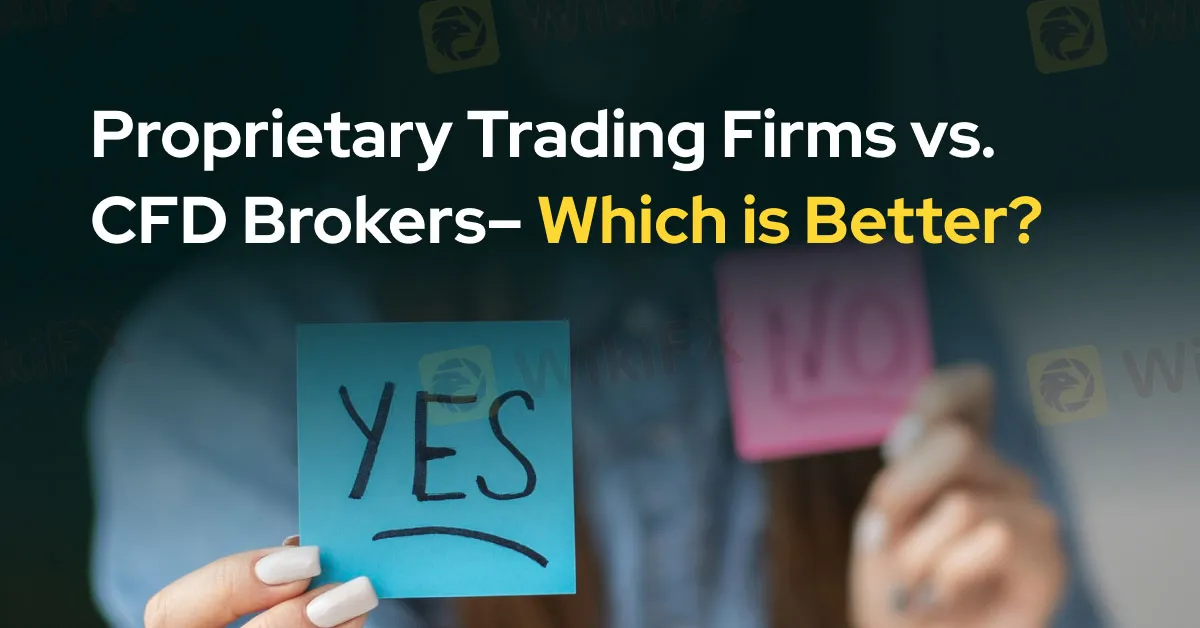Proprietary Trading Firms vs. CFD Brokers – Which is Better?
Abstract:In online trading, proprietary trading firms and CFD brokers represent two prominent models, each offering distinct opportunities and facing unique challenges. Understanding their differences can aid traders in making informed decisions about their trading strategies and investments.

In online trading, proprietary trading firms and CFD brokers represent two prominent models, each offering distinct opportunities and facing unique challenges. Understanding their differences can aid traders in making informed decisions about their trading strategies and investments.

Proprietary trading firms, often called “prop firms,” trade assets using their own capital. Traders at these firms use sophisticated strategies to generate profits, with a share of the profits going to the traders. One key advantage is that traders do not need to invest their own money, which mitigates personal financial risk. These firms provide capital, allowing traders to focus solely on their strategies without worrying about potential losses of their own funds.
Proprietary trading firms offer access to advanced trading platforms, research, and tools that might be otherwise costly or inaccessible. This professional environment can significantly enhance a trader's performance and growth. Additionally, successful traders can earn substantial financial rewards through profit-sharing agreements. Many prop firms also offer extensive training programs and mentorship, making them an attractive option for novice traders looking to develop their skills with professional guidance.
However, there are downsides. A significant portion of the profits is retained by the firm, meaning traders do not keep all the profits they generate. The high-pressure environment can lead to intense performance expectations, and stringent risk management rules can limit a traders freedom to implement their strategies fully. Job security can also be a concern, as underperformance can lead to quick termination in this high-stakes setting.

CFD (Contract for Difference) brokers allow traders to speculate on the price movements of various financial instruments without owning the underlying assets. CFDs are derivatives that let traders go long or short on markets such as stocks, indices, commodities, and forex.
CFD brokers typically offer high leverage, enabling traders to control large positions with a relatively small capital outlay. This leverage can amplify profits but also increases the risk of significant losses. CFD trading provides access to a broad range of markets and instruments, allowing for diversification and strategic responses to different market conditions. Traders can speculate on both rising and falling markets, and avoid the complexities associated with owning actual assets, such as storage or settlement issues.
Despite these advantages, CFD trading comes with risks. The leverage that enhances profit potential can also magnify losses, making risk management crucial. Additionally, the costs associated with CFD trading, including spreads, commissions, and overnight fees, can erode profits. Some CFD brokers operate as market makers, taking the opposite side of their clients' trades, which can create conflicts of interest. The regulatory environment for CFD trading varies by jurisdiction, affecting the safety and reliability of CFD brokers.

Choosing between proprietary trading firms and CFD brokers depends on individual goals, experience levels, and risk tolerance. Proprietary trading firms are suitable for those who prefer to trade without risking personal capital and value a structured, professional environment with potential for significant financial rewards and professional growth. Conversely, CFD brokers cater to traders with a higher risk appetite who are comfortable with leverage and seek flexibility in speculating on various markets.
In summary, both proprietary trading firms and CFD brokers offer unique benefits and challenges. Prop firms provide a professional setup with reduced personal financial risk but involve high pressure and profit-sharing constraints. CFD brokers offer flexibility and high leverage but come with significant risk and potential conflicts of interest. Understanding these dynamics is essential for making an informed decision in the competitive realm of online trading.

Read more

Trading is Not Gambling—Unless You Make It So
In the world of online trading, a common misconception persists: trading is often seen as no different from gambling. This belief is particularly prevalent among newcomers, who may view the financial markets as a fast-paced game where winning is just a matter of luck. But trading, when done correctly, is far from mere chance!

Saxo Singapore Discontinues SaxoWealthCare and SaxoSelect
Saxo Singapore will discontinue SaxoWealthCare and SaxoSelect by December 2024, advising clients to withdraw funds and offering alternative investment options.

CySEC Extends Suspension of CIF License for FTX (EU) Ltd Until May 2025
The Cyprus Securities and Exchange Commission (CySEC) has announced an extension to the suspension of the Cyprus Investment Firm (CIF) license held by FTX (EU) Ltd. This decision follows a series of prior announcements from CySEC dating back to November 2022 and most recently updated on April 16, 2024

Will Trump's reelection drive more market growth?
According to the report, U.S. markets celebrated Wednesday as stocks rocketed upward following the decisive victory of former President Donald Trump in Tuesday’s presidential election. Investors were quick to respond, with the Dow Jones Industrial Average skyrocketing by 1,507 points, or 3.57%, to reach a record high—marking the first time the index has gained more than 1,000 points in a single day since November 2022. Similarly, the S&P 500 surged by 2.5%, and the Nasdaq climbed 2.95%, bringing all three major indexes to fresh highs.
WikiFX Broker
Latest News
US Presidential Election in Overdrive: Exploring Forex Wealth Codes with WikiFX App
Do You Really Know Your Trading Game?
CySEC Tightens Compliance Rules for Crypto and FX/CFD Brokers
Will Trump's reelection drive more market growth?
How U.S. Elections Have Influenced Financial Market Trends Since 2000
Zenstox: A Trader’s Nightmare? An Inside Look at Alleged Scams and Unethical Practices
eToro sponsors the Bitcoin Mena Conference
FCA WARNING AGAINST Touchstone Markets
Caroline Ellison Begins Two-Year Sentence for FTX Scandal
FCA Convicts 2 Individuals from CCX Capital & Astaria Group in £1.5M Crypto Scam
Rate Calc
